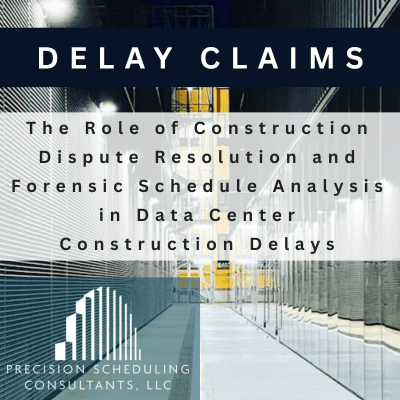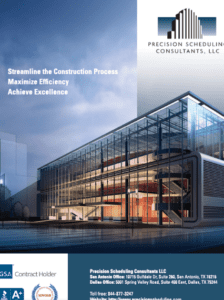With the increasing demand for data storage, processing, and AI capabilities, the timely completion of data centers is paramount. However, various factors—ranging from unexpected site conditions to changes in design—can lead to disputes over delays. Addressing these delays effectively is crucial to maintaining both project timelines and financial viability.
This is where construction dispute resolution and forensic schedule analysis play a key role. By leveraging specialized tools and techniques, these processes help project stakeholders identify the causes of delays. They also help resolve conflicts and ensure the timely completion of data centers.
Complex Construction Dispute Resolution Issues
Construction disputes are not uncommon in large-scale projects, especially when multiple contractors, subcontractors, and suppliers are involved. In data center construction, where project timelines are often tight and investments are significant, even minor delays can lead to major financial repercussions. Disputes over delays can arise for a variety of reasons. These include disagreements over project scope, unforeseen site conditions, or issues with the quality of materials or workmanship.
To resolve these disputes effectively, various methods of construction dispute resolution (CDR) are employed. Traditional methods, such as litigation, can be costly, time-consuming, and damaging to business relationships. As a result, many data center construction projects turn to alternative dispute resolution (ADR) methods. These methods are more flexible and efficient.
Key Methods of Construction Dispute Resolution (CDR)
- Mediation: In mediation, a neutral third-party mediator helps both parties come to a mutually acceptable agreement. This process allows for open communication and negotiation, which can help preserve professional relationships. Mediation is often a faster, less costly option than litigation.
- Arbitration: Arbitration involves a neutral third party who listens to both sides of the dispute. Then, the arbitrator issues a binding decision. Arbitration can be faster than litigation. It is often preferred in complex construction cases where parties want a final, binding resolution without the uncertainty of court proceedings.
- Negotiation: In many cases, parties can resolve disputes through direct negotiation. This process involves open dialogue between the parties to address concerns and find a resolution. It is the most flexible form of dispute resolution and allows the parties to retain more control over the outcome.
While these methods can help resolve disagreements over delays, the process of forensic schedule analysis is often used to pinpoint the exact causes. It also determines responsibility for the delay.
Forensic Schedule Analysis: Investigating the Causes of Delay
Forensic schedule analysis is the process of examining a project’s construction schedule. It determines the causes of delays and their impact on the overall project timeline. In data center construction, where time is a critical factor, understanding the specific reasons behind delays is essential. This can help resolve disputes and keep the project on track.
Forensic schedule analysis involves reviewing project schedules and comparing planned versus actual progress. It also includes identifying any discrepancies. This process typically requires the expertise of a forensic schedule analyst. The analyst uses specialized tools and techniques to assess the data and pinpoint the causes of delays. Common causes of delays in data center construction include:
- Design Changes: Alterations to the original design, whether due to client requests or unforeseen issues, can significantly impact the construction timeline. Identifying when and how design changes occurred is critical. This helps in determining if these changes were responsible for any delays.
- Unforeseen Site Conditions: Subsurface issues, weather conditions, or site access problems can delay construction projects. Forensic analysis helps establish whether these conditions were known or foreseeable at the project’s outset. This can determine whether contractors are entitled to time extensions.
- Labor Shortages or Workforce Issues: Delays due to labor shortages, strikes, or inefficiencies can also occur. Forensic analysis can review labor data to assess whether delays were due to staffing issues. It can also verify whether the workforce was sufficient to meet project requirements.
- Material Delays: Delays in the delivery of construction materials can affect project timelines. A forensic schedule analysis will determine if these delays were caused by suppliers, shipping issues, or logistical mismanagement.
- Poor Project Management: In some cases, delays are the result of poor planning, coordination, or communication among the project team. A forensic schedule analysis can identify where breakdowns in project management occurred and which parties are responsible.
By identifying the root causes of delays, forensic schedule analysis can provide the evidence necessary to resolve disputes. This process also helps to determine whether the delays were excusable, non-excusable, or compensable. This information directly affects the liability of each party involved.
How Forensic Schedule Analysis Helps Resolve Disputes
Once the forensic schedule analysis is complete, the findings can be used in dispute resolution. In cases of litigation or arbitration, the analysis serves as an impartial, fact-based report that helps to clarify responsibility. The report can provide an objective basis for determining
- Cause and Effect: The analysis shows how delays in one part of the project affected the overall timeline. By establishing a clear chain of events, it helps parties understand how specific actions or inactions caused delays.
- Extension of Time Claims: Forensic schedule analysis helps determine whether a contractor is entitled to an extension of time. This applies to delays beyond their control, such as unforeseen site conditions or changes in design.
- Cost Recovery: If delays were caused by other parties, forensic analysis can assist in determining the financial impact on the project. It can help quantify the additional costs incurred due to delays, which is vital for recovering expenses.
- Mitigating Damages: By identifying how delays unfolded, forensic analysis provides insight into potential solutions and ways to mitigate further delays. This is crucial for project teams seeking to minimize the impact of disputes and avoid escalating costs.
The Importance of Timely Resolution in Data Center Construction
In data center construction, timely resolution of disputes is critical. Delays in construction can have far-reaching consequences, especially given the strategic importance of data centers. These centers support cloud computing, AI, and other digital infrastructures. A delay in completing a data center can disrupt the global economy, hinder business operations, and lead to substantial financial losses.
Efficient dispute resolution processes, combined with accurate forensic schedule analysis, allow stakeholders to resolve issues quickly. This helps projects move forward. It not only keeps projects on track but also helps maintain professional relationships and protects the financial interests of all parties involved.
Conclusion: Enhancing Data Center Construction Outcomes Through Dispute Resolution and Forensic Analysis
Data center construction projects are highly complex and come with their own set of challenges, particularly regarding timely completion. When delays occur, the resulting disputes must be addressed swiftly to avoid costly consequences. Construction dispute resolution methods, including mediation, arbitration, and negotiation, are critical tools for resolving conflicts without lengthy litigation.
Forensic schedule analysis plays a crucial role in these processes. It provides a clear understanding of the causes of delays. By examining construction schedules, identifying the root causes, and evaluating their impact, forensic analysts help stakeholders find fair and effective solutions.
In the context of data centers, which support the backbone of modern economies, minimizing delays is essential. Effective dispute resolution and forensic analysis ensure that data centers are completed on time. This enables them to meet the growing demands of AI, cloud computing, and digital infrastructure.


